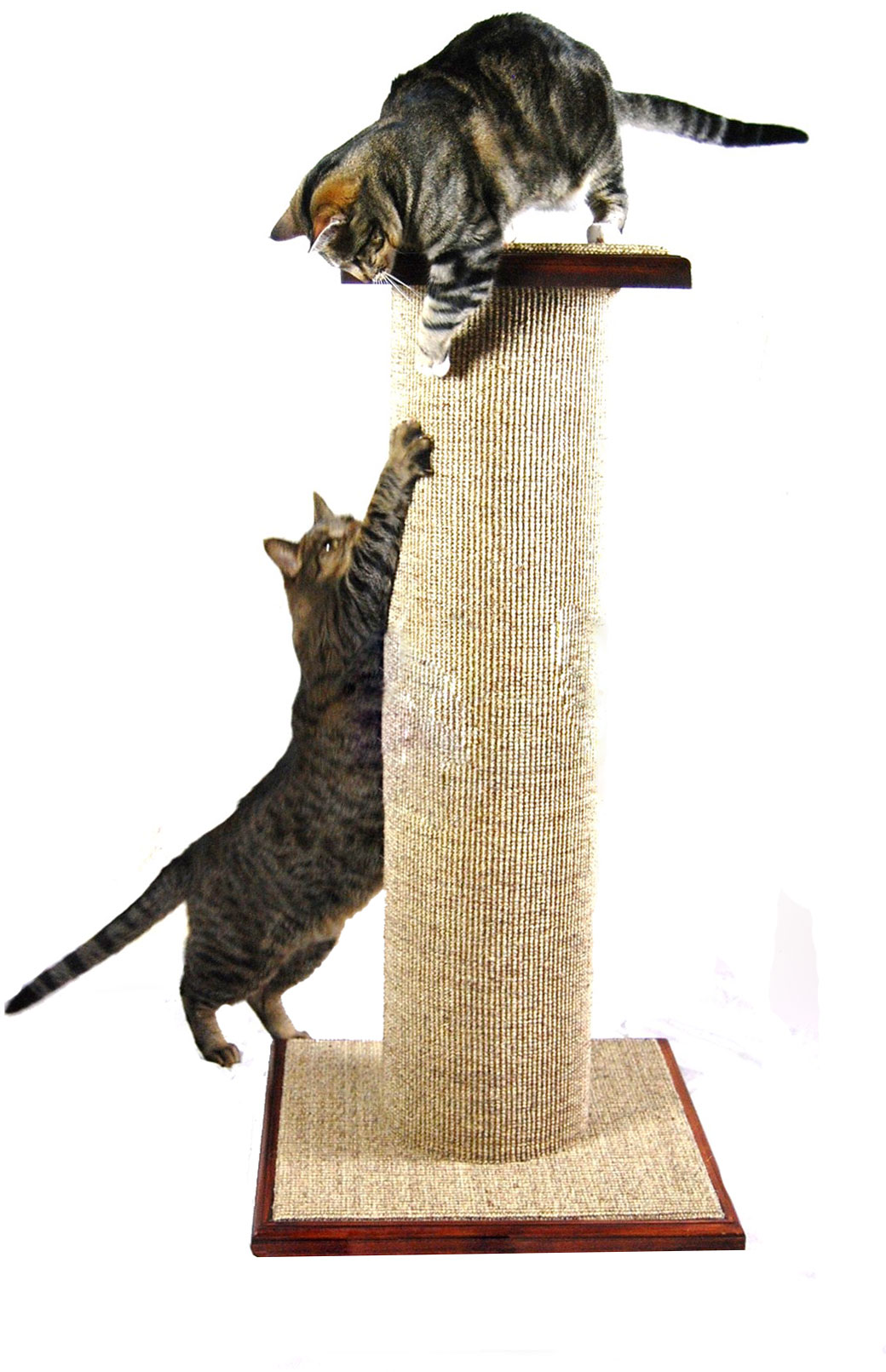Why Some Cats Do Not Like Doors
 If cats ruled the world more than they already do, every door would have a cat flap. Cats disapprove of the concept of closed doors. “Why would you intentionally block my access to a place?” is what they seem to be thinking.
If cats ruled the world more than they already do, every door would have a cat flap. Cats disapprove of the concept of closed doors. “Why would you intentionally block my access to a place?” is what they seem to be thinking.
What Do Cats Have Against Closed Doors?
Simply put, cats want to open doors for these reasons:
- They smell or hear something on the other side of the closed door that compels them to want to investigate.
- They know that one or more members of their human “staff” are on the other side of the door, and they don’t want to be prevented from cuddling with or controlling these people.
- They consider the area beyond the door to be part of their territory, which they feel the need to patrol.
- They are persistently curious—“What’s on the other side?”
How Cats Say “Open the Door”
Cats can use these methods to effectively communicate with you that they'd like a door to be opened:
- Yowling right outside the door
- Pawing at the door
- Attempting to herd you toward the door: coming over to you, brushing up against you, meowing, and going to the door, so you’ll get the idea
- Other means, as thought up by the resourceful feline mind
Solutions for Times When Kitty Wants an Open Door Policy but You Don't
Of course, there are some reasons for closed doors that humans consider to be valid: privacy, safety, energy efficiency, aesthetics, and perhaps protection from cat fur. Sometimes our viewpoints and our cats’ viewpoints are not quite in sync, and in those cases, we try to work out reasonable compromises. Let’s consider some possible resolutions for various types of door-related issues.
Tip: If a door must be shut for a kitty’s safety, make sure everyone in the household follows this rule. When in doubt, install a child-proof lock on the door.
Closets and Cats
Do a check in advance to make sure there is nothing blatantly dangerous in the closet. Get rid of plastic dry-cleaner bags; put any medications or chemicals in kitty-proof containers. Once you do this, it’s usually OK to let your kitty poke around and explore the various smells, textures, and contours of the closet while you supervise. Do not close the door until kitty exits the closet.

When a Door Is Used as a Scratching Post
Sometimes a kitty claws a door because it has an appealing surface. A good solution to this problem is to buy a sturdy scratching post and place it as near to the door as practical. You can never have too many scratching posts! Also see “Deterrents” below.
The "Not Always Great" Outdoors
Check out this article, "How to Decide on an Indoor or Outdoor Lifestyle for Your Cat" to learn about the outdoors’ appeal to cats, the dangers that lie beyond the walls of kitty’s and your home, and solutions for keeping your cat safe, happy, satisfied, and fit without letting him roam freely outside.
If your cat tries to get outside all the time or scratches at door that goes outside, try these tips:
- To reduce your kitty’s wanderlust, create an accommodating indoor environment that satisfies your cat’s desire to play, explore, discover, and manage territory as well as sleep and relax in peace.
- To divert attention away from the front door, don’t play or engage in fun activities with your cat near the front door, and when coming home, greet your kitty in the kitchen or some other location that’s away from the front door.
- During times of upheaval such as remodeling, moving, or parties with lots of people coming and going, sequester your kitty in a well-appointed, quiet room that has ample hiding spots, and put a sign on the door to that room indicating that it must be kept shut. If hosting a get-together, consider putting “keep closed when not in use” signs on all doors used by guests that lead to the outside.
Compromise solutions for cats that show a persistent interest in going out include outdoor enclosures with sturdy screens and cat doors to the house, and harness and leash walks.
The Bathroom Door

The fact that so many cats want to join their humans when they’re in the bathroom should put to rest any rumors that they are aloof.
So if your cat is conveying that he wants to accompany you in the bathroom, do you oblige him? It’s your call.
For some, the bathroom is the last refuge of peace and quiet and is, thus, a no-cat zone. For others, having a relatively non-judgmental furry friend who wants to be with you at all times, in all places, is bemusing and endearing—and perhaps having a graceful cat in the midst enhances the sense of calm.
A compromise solution. Keep some wand toys in the bathroom. When in the bathroom—with the door closed—and you sense a kitty just outside, grab a wand toy and make the toy move coyly under the door, perhaps peeking out and retreating. You may very soon see a playful paw batting the toy, and you may find that this bit of frivolity makes bathroom chores more enjoyable. Your kitty will get the benefit of interactive play, but you’ll still have a modicum of privacy.
The Bedroom Door, When You’re Sleeping
While some of us welcome our kitty onto the bed for snuggling, not everyone can get a good night’s sleep with a cat in the bedroom. When not snoozing, a kitty may try to coax his humans into playing or refilling the food bowl. This article explains a number of possible ways to achieve both sleep and kitty contentment during the night, including installing a comfortable window perch in the bedroom and indulging the kitty in a pre-bedtime play session and snack. But if these measures are insufficient, you may need to need to keep your cat out of the bedroom at night. Your determined feline, however, may park himself outside the door and complain, vocally or otherwise. In this case, you may have to block his access to the door area. Learn more in the next section.
Deterrents for Helping Cats Respect Closed Doors
Sometimes you just have to keep your kitty away from a particular door. Here are several options for accomplishing that:
- Place one or more training mats, which cats find uncomfortable to walk on, just outside the door. Note: You don’t want to step on these mats in your bare feet; take that into account when considering this option.
- You can also affix the mats to the side of a door, to discourage pawing and scratching at the door.
- Sticky Paws, attached to a door, will often dissuade a kitty from scratching it, but you may need several strips to cover enough of the door to get the full deterrent effect.
- In some instances, you can move an object in front of the door that blocks the kitty’s access to it but is easy for a human to move out of the way.
Are Polydactyl Cats Better at Opening Doors?
Some of their caretakers make this claim. They say the polydactyl cats use their extra toes like opposable thumbs.
Enticements to Keep a Kitty Happily Away From Off-Limit Doors
Always try to combine “No, you may not do this, kitty” with “but here are some great alternatives I think you’ll like.” You want to be able to satisfy your cat’s needs, such as playing, perching, exploring, affirming territory, and socializing without significantly sacrificing your own needs, including sleeping and having occasional privacy. Strive for win-win-solutions. If, like most people who care for cats, you must restrict your cat from certain areas, make sure the areas in which he’s allowed are interesting and accommodating from his point of view.
For example:
- Fill the house with scratching posts and hideaways, which most cats love.
- Place sleeping platforms near windows so your kitty can view the outdoor goings-on before drifting off to sleep.
- Occasionally, give your cat a surprise bed of some recently worn clothes—preferably clothes you don’t mind not wearing for a while in case kitty really likes his new sleeping arrangement. Since smells are so important in the cat world, when your cat sleeps on clothes that have your scent, it feels to him somewhat like he’s sleeping with you.
- Leave out paper bags (with handles snipped or removed) and cardboard boxes that your kitty can explore. When he’s bored with those items, change their locations, modify them (for example, add a new entry/exit or porthole in a box), or replace them.
- Hide toys and treats here and there. Just remember where you put them.
- Give your kitty ample attention each day when you can, and he won’t feel so deprived that he can’t go anywhere at any time. Although, occasionally, he may dramatize his disappointment, to test you and see if you'll give in.
It's the Principle
If you have a cat, you probably know this scenario: Kitty plants himself by the door and meows plaintively or claws at the door, insisting that you open it. Finally, you give in; you open the door. But your sweet kitty doesn’t dash into the room behind the door; he doesn’t even cross the threshold. He takes a step or two, peeks around the corner for a second, and then walks away.
That’s just part of being a cat.
You May Also Like These Articles:
Why Does My Cat Sleep on My Head?
Why Do Cats Knock Things Over?
How to Train Your Cat to Let You Sleep
Notice: Ask-a-Vet is an affiliated service for those who wish to speak with a veterinary professional about their pet's specific condition. Initially, a bot will ask questions to determine the general nature of your concern. Then, you will be transferred to a human. There is a charge for the service if you choose to connect to a veterinarian. Ask-a-Vet is not manned by the staff or owners of CatHealth.com, and the advice given should not delay or replace a visit to your veterinarian.





